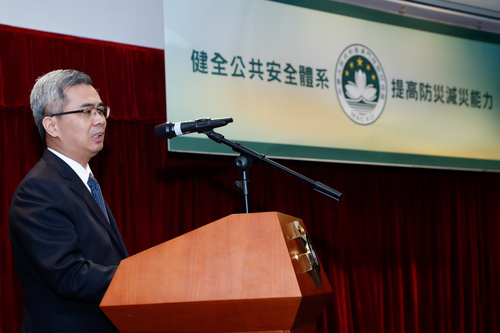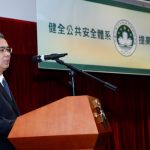 Secretary for Security, Mr Wong Sio Chak, speaks at a seminar on the improvement of public safety system, disaster prevention and mitigation capabilities of Macao.
Secretary for Security, Mr Wong Sio Chak, speaks at a seminar on the improvement of public safety system, disaster prevention and mitigation capabilities of Macao.
To assist the MSAR Government in reviewing and improving its disaster response system and planning, a national professors team led by the Deputy Director of the National Commission for Disaster Reduction and the Head of State Council Emergency Response and Management Expert Team, Mr Shan Chunchang, arrived in Macao on 30 November, for a special seminar on Perfecting the Public Security System and Strengthening Disaster Prevention and Reduction Capabilities.
The team also divided into groups, to exchange views with various departments, and followed up with the research and investigation work after the visit of the National Commission for Disaster Reduction expert team in mid-September.
The visiting professors team comprises 14 members, including the Deputy Director of the National Disaster Reduction Centre of the Ministry of Civil Affairs, Mr Zhang Xuequan; Deputy Director of the Institute for Public Safety Research of Tsinghua University, Professor Yuan Hongyong; and mainland China experts in disaster prevention and reduction, emergency management, meteorology, water conservation, electricity, engineering, information and emerging risks research. Upon arrival, they immediately proceeded to the Civil Protection Centre for the special seminar.
Prior to the seminar, the Commission for Reviewing and Monitoring the Improvements of the Response Mechanism to Major Disasters of the MSAR Government signed a commission agreement with the Institute for Public Safety Research of Tsinghua University, the Institute for Emerging Risks Research of North China University of Technology, and the National Disaster Reduction Center of the Ministry of Civil Affairs, on compiling the report titled “Summary of assessment of the damage caused by Typhoon Hato in Macao, and recommendations on optimising Macao’s emergency response and management system”.
Based on the Working Report of the China National Commission for Disaster Reduction’s Expert Group on Assessing Typhoon Hato Damage in Macao, which was announced at the end of September, the joint research team headed by Mr Shan Chunchang will consolidate the opinions of the MASR Government and the public on the report, apply scientific methodology and a fundamental research approach, and comprehensively review the experiences learned from the damage by Typhoon Hato, to compile a final report titled “Summary of assessment of the damage caused by Typhoon Hato in Macao, and recommendations on optimising Macao’s emergency response and management system”.
The report will focus on studying and analysing problems of public concern related to meteorology, water and electricity supply interruption and flooding, and provide more substantial and comprehensive recommendations on establishing a disaster prevention, reduction and relief system; enhancing lifeline engineering projects, disaster prevention and resistance of major infrastructure; improving Guangdong-Hong Kong-Macao synergy and collaboration on emergency responses; strengthening major disaster and risk management capabilities, laws and regulations and standards related to disaster prevention and reduction; and cultivating safety awareness and quality assurance.
The summary report will also provide ideas, solutions and means for conducting major projects, such as studying and assessing Macao’s overall risks and disaster response capabilities; safe operating capacity, emergency response commanding platform and remote disaster recovery and backup; construction of emergency shelters and resettlement sites; establishment of a base for public safety and popular science publicity and education, and a base for training professional rescue teams; and construction of waterfront flood control and drainage facilities for the Inner Harbour.
During the seminar, Mr Shan introduced to all attendees the formation of the national emergency response planning system, and shared analyses, conclusions and experiences from emergency cases in mainland China. He said the aim of the team's second visit to Macao is to support the MSAR Government with further optimising Macao’s emergency management system.
According to Mr Shan, the overall approach to public safety and emergency management has been changed from one-dimensional to integrated, from handling to prevention and preparation, and from simple disaster reduction to a merger of disaster reduction and sustainable development.
He stressed that a new public safety concept should be established with the principles of putting people first, making life of paramount importance, and safe development. It must prioritise prevention, and implement our plan to construct a comprehensive, three-dimensional public safety network. At the same time, it should leverage the technological advances to enhance emergency response capabilities, such as basic emergency management skills with risk governance as the core, an early warning system, communication and command system, emergency rescue team, material supplies, emergency transportation, secure communications, recovery and redevelopment capabilities, survival and support of technologies and industries, and popular science education and promotions on emergency management.
The Secretary for Security, Mr Wong Sio Chak, expressed his gratitude to the expert team for their second visit to Macao and their guidance. He said that the seminar provides Macao with significant guidance on optimising its emergency management system.
According to Mr Wong, when dealing with disaster prevention and reduction and emergency management work, we should raise our awareness of public safety, and fully understand the concept of “be vigilant in peacetime” and “preparedness averts peril”; in terms of action, we must seriously deploy our disaster prevention and reduction and emergency management work, according to the recommendations of the expert team.
More than 100 government officials and representatives attended the seminar, including the Commissioner-General of the Unitary Police Service, Mr Ma Io Kun; the Director General of the Macao Customs Service, Mr Vong Iao Lek; the Chief-of-Office of the Chief Executive's Office, Ms O Lam; members of the civil protection system, and representatives from departments involved in disaster responses.
The visiting team divided into groups in the afternoon, for exchanges with senior representatives from the Civil Protection Centre, the Fire Service, the Economic Services Bureau, the Meteorological and Geophysical Bureau, the Environmental Protection Bureau, and the Lands, Public Works and Transport Bureau. Topics discussed and exchanged included Macao’s emergency management, public safety for the city, the general situation of fire services, post-disaster financial assistance, policies supporting SMEs, meteorological forecast technology, capability of handling natural disasters and emergencies, urban development planning, flood prevention and drainage, and focusing fundamental research on optimising Macao’s emergency management system.
View gallery



